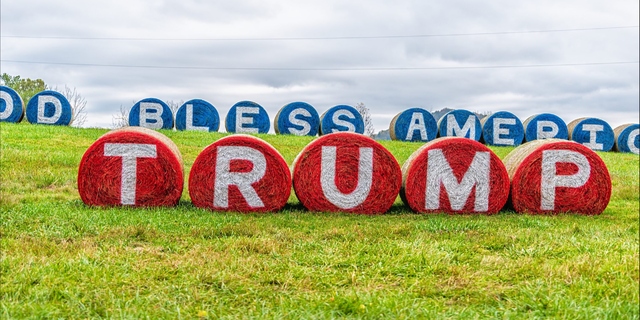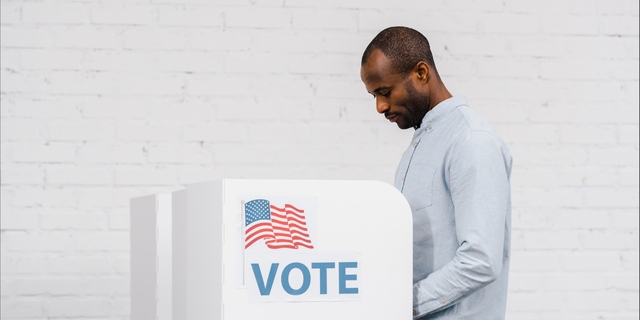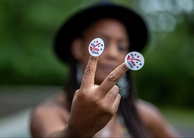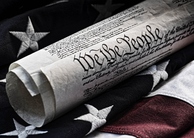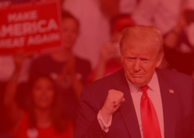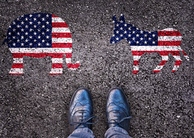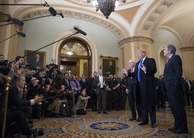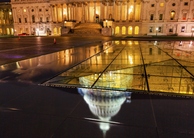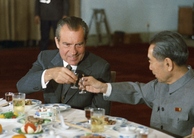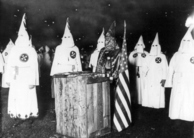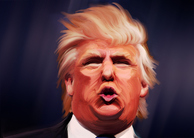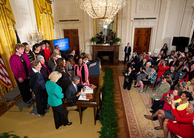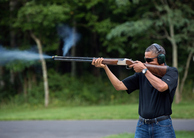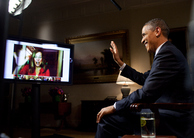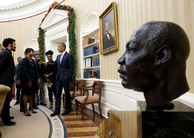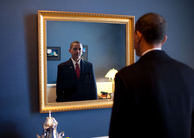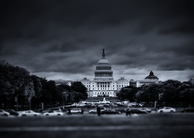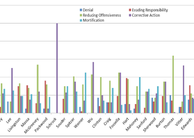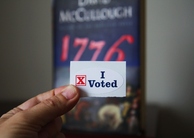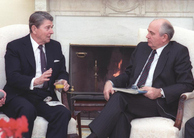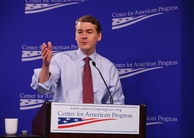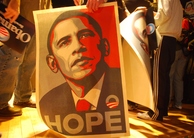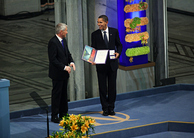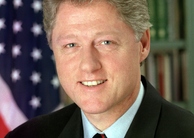|
American Politics (tagged articles)
The keyword American Politics is tagged in the following 48 articles.
2022, Vol. 14 No. 06
Two of the most prevalent protest movements in recent history were the Black Lives Matter and the #StopTheSteal movements. While there are many differences between the two, one of the most prevalent is their use of violence. Whereas the BLM movement... Read Article »
2022, Vol. 14 No. 04
During the summer of 2020, two fatal shootings occurred following Black Lives Matter protests. The first event involved Kyle Rittenhouse in Kenosha, Wisconsin, and the second Michael Reinoehl in Portland, Oregon. Two shootings, each committed by... Read Article »
2022, Vol. 14 No. 01
Was the selection of Donald Trump in the 2016 Republican Primary a strategic or a substantive choice? Donald Trump defied many predictions when he won the GOP’s presidential nomination despite his initial ‘underdog’ standing and... Read Article »
2021, Vol. 13 No. 12
This thesis explores the inherent conflict between liberty and equality—the twin pillars on which the United States and its Constitution are predicated—and the materialization of this conflict in storm center texts, whose subjects cover... Read Article »
2021, Vol. 13 No. 12
Political polarization has been an increasingly salient point of discussion since the 2016 presidential campaign, the election of Donald Trump, and into today. Beyond emphasizing partisan and issue-based divides, scholars have identified emotion... Read Article »
2021, Vol. 13 No. 10
This paper assesses the political preferences and ideologies of the Trump administration and how they influenced framing issues in a way that has underestimated the threats of right-wing militia groups in the United States. President Trump and officials... Read Article »
2021, Vol. 13 No. 09
One of the key ways to measure and analyze the performance of such expansive countries such as the United States is to look at their institutions and corresponding values. This paper offers a framework of thin democracy, the institutions, norms,... Read Article »
2021, Vol. 13 No. 03
Western conservatism is often conceived as the philosophy of large landowners in the past and business executives in the present. Heightened awareness of racial and class disparities in recent years has increased the perception that conservatism... Read Article »
2021, Vol. 13 No. 01
This paper aims to fill the gap in quantitative research on out of district donations at state levels of American government. Examining inequality in donor representation is an important part of ensuring an equitable and just democracy. Using donor... Read Article »
2020, Vol. 12 No. 11
The United States Constitution is the longest lasting written constitution in the world, despite the fact that one of the key framers, Thomas Jefferson, believed that written constitutions ought to have a nineteen year expiration date before they... Read Article »
2020, Vol. 12 No. 10
The emergence of social media platforms into American life has remarkably altered the political communication landscape. Websites such as Twitter have become a prioritized communication medium for politicians looking to directly reach the electorate... Read Article »
2020, Vol. 12 No. 10
In the 116th United States Congress, women hold 23.2% of House seats and 25% of Senate seats. Down the ballot, across state and local elected offices, women are underrepresented in their communities. This continual disparity presents a fundamental... Read Article »
2020, Vol. 12 No. 09
Political polarization in the United States has been one of the main issues at the forefront of American Politics. Studies show that political parties have in fact become more divided ideologically than ever, and more Americans that belong to one... Read Article »
2020, Vol. 12 No. 02
‘State fragility’ comes in many manifestations, ranging from violent civil conflict to state-sanctioned corruption. Often the term is paired exclusively with the developing world. This is a misnomer. Those within the liberal world order... Read Article »
2020, Vol. 12 No. 02
Between 2012 and 2017, the number of asylum applications from El Salvador, Guatemala, and Honduras—countries collectively known as the Northern Triangle—increased by eight hundred percent[1]. The Trump administration has responded by... Read Article »
2019, Vol. 11 No. 02
American Politics today operates in an arena where truth and objective reality are bent to the designs of particular interests, powerful people and commercial profiteers. All facts are questioned; the truth has purposes. Populist and nationalist... Read Article »
2017, Vol. 7 No. 2
This paper examines the reasons behind people's different views of defining what "patriotism" is. Three multivariate linear regressions were performed to determine the causes behind an individual's level of patriotism. Two of the regression models... Read Article »
2016, Vol. 7 No. 1
This paper investigates the influence of U.S. foreign policymakers' perceptions towards China on policy formulation during the Cold War. The influence of perceptions, especially perceptions surrounding the ideology of combatant states, is especially... Read Article »
2016, Vol. 7 No. 1
The year 2015 saw heightened racial and ethnic tension in the United States, with particular regard to Latin American immigrants and the U.S. presidential election. Discourse theory assumes that identity (re)production serves to legitimize, institutionalize... Read Article »
2016, Vol. 8 No. 12
Near the end of 2015, in the midst of recent presidential and congressional debates, House Republicans proposed a bill to defund Planned Parenthood, blocking all of the organization’s federal funding, after the release of videos discussing... Read Article »
2016, Vol. 8 No. 10
In the aftermath of the attacks on September 11, 2001 fear and anger shaped American attitudes in response to terrorism. Even so, this alone does not explain how Americans became open to the use of torture during the “Global War on Terror&... Read Article »
2015, Vol. 12 No. 1
This is the first line from the Ku Klux Klan's (KKK) "Objects and Character of the Order" (Horn, 1939, p. 38). Although these are not words that most modern Americans would ascribe to the Klan, one will find descriptions that depict the Klan as "... Read Article »
2015, Vol. 7 No. 11
In the United States, Americans elect 50 governors, roughly a third of the U.S. Senate’s 100 members, all 435 members of the U.S. House of Representatives, and, every four years, a president. Together, these are the most high profile elections... Read Article »
2015, Vol. 7 No. 10
While some believe that scientists should communicate their research apolitically in research journals, others believe that scientists should communicate to the media in order to bring awareness to their research topic. As a compromise to these... Read Article »
2015, Vol. 7 No. 02
In 1972, The Equal Rights Amendment was first introduced to Congress to protect an individual’s irrefutable equality of rights under the law regardless of sex. Although it passed both houses and failed to secure the necessary votes for state... Read Article »
2015, Vol. 7 No. 02
Gun control and federal reform of firearm legislation have recently become popular and contentious topics in Washington D.C. and around the country. Yet despite vast public support, none of the legislation proposed by the Obama administration has... Read Article »
2015, Vol. 7 No. 02
Much has been said in regards to Barack Obama’s revolutionary use of technology during both his 2008 and 2012 campaigns for President of the United States. Yet, during his administration, that groundbreaking tactic suddenly disappeared. In... Read Article »
2015, Vol. 7 No. 02
The presidential campaign of Barack Obama was met with enthusiasm and controversy. If you were alive and cognizant at the time, you understood the importance and historic value of the 2008 election no matter your position. Barack Obama, the Hawaii... Read Article »
2015, Vol. 7 No. 02
Philosophers have been grappling at what characterizes the manifestation of what we call “ideology” for some time now. Is it based in some written or spoken manifesto? Or is it much murkier than that— a frame for what we think... Read Article »
2014, Vol. 6 No. 11
Environmental concerns have been of increasing salience to Americans since the 1960s, when Rachel Carson published Silent Spring and spurred public anxiety over the use of the widely utilized pesticide DDT. The impact of Carson’s work was... Read Article »
2014, Vol. 4 No. 2
The federal earmark is a topic often lamented by the general public as corrupt and wasteful. Until recently, this "pork" was a mainstay of politics in Washington. Because distributive spending is often used to advance partisan goals such as reelection... Read Article »
2012, Vol. 3 No. 2
This study sought to apply a Crisis Communications lens to the area of American political sex scandals. Applying William Benoit's "Theory of Image Restoration" to 24 American sex scandals, ranging from 1987 to 2011 and all of which received significant... Read Article »
2013, Vol. 5 No. 06
During the 2008 Presidential Election, voters designated health insurance reform as a key issue for their future president to work on. With 46.3 million Americans uninsured in 2008, voters demanded change, and upon his election, President Barack... Read Article »
2013, Vol. 5 No. 06
Each year, thousands of colleges and universities across the United States hold commencement. This is a time when campus is in full bloom—manicured lawns, farewell hugs from classmates, and final exams. As the graduates march in unison to... Read Article »
2013, Vol. 3 No. 1
The continued application of the death penalty in the United States marks the country as an extreme outlier among its allies and like-minded nations in the 21st century. In order to explain America's retention of this criminal punishment, scholars... Read Article »
2013, Vol. 5 No. 04
When U.S. President Ronald Reagan left office in 1989, he enjoyed a reputation as one of the most rhetorically dynamic Presidents of the twentieth century. His remarkable speaking ability was not surprising because, before his transition into politics... Read Article »
2012, Vol. 4 No. 09
Limits lie at the heart of the American political system. No governmental body or figure has unlimited authority—all are checked by the others. However, beyond this, political thinkers are divided over how best to mitigate majoritarian influence... Read Article »
2012, Vol. 1 No. 1
Since the mid-20th Century, voting rights activists have sought to open the American electoral system and reduce the costs of voting for all citizens. In this study, I look specifically at the impact of polling place localization in relation to... Read Article »
2012, Vol. 5 No. 2
Evan Thomas's recent book, The War Lovers, chronicles the "monumental turning point" of the U.S. declaration of war against Spain in 1898, and the small circle of men who pressed for war, and for an American empire. The central figures, for Thomas... Read Article »
2011, Vol. 5 No. 1
In 2001, German President Johannes Rau made a statement that divided Germany. In an interview with a television station, Rau said that although he is “pleased and grateful” to be German, he cannot be “proud” of it–&... Read Article »
2011, Vol. 3 No. 03
The 2010 Colorado Senate race was one of the most contentious and hard-fought races in the country during the 2010 election cycle. Like many other races, it pitted an establishment Democrat against a tea-party backed Republican. The outcome of the... Read Article »
2011, Vol. 3 No. 02
The 2010 Washington State senatorial race was crucial for Republicans, as it could have earned the GOP a Senate majority and eliminated the likelihood of Vice President Joe Biden’s casting a tie-breaking vote. A victory from Dino Rossi, the... Read Article »
2010, Vol. 2 No. 07
During his first term in office, President George W. Bush claimed that he had a clear political mandate from the voters of the United States to achieve his political goals. However many refuted the claim that President Bush had a political mandate... Read Article »
2010, Vol. 2 No. 03
On November 2nd, 2000, FOX News declared George W. Bush to be the next President of the United States (Moore 36). Within four minutes, CBS, ABC, CNN, and NBC had all decided this was also true (36). The source of this knowledge was none other than... Read Article »
2010, Vol. 2 No. 02
The U.S. political system has become strangled by the misconceptions, dishonesty, and unfounded beliefs held and espoused by the opposing political parties. The truth is hard to come by, and even harder to recognize in the current political climate... Read Article »
2010, Vol. 2 No. 01
Party identification among individuals is determined by multiple factors including current marital status and other variables such as income and education level. The rate of marriage for people over the age of 18 in the United States has decreased... Read Article »
2010, Vol. 2009/2010 No. 1
On the 20th January, 2009, millions of people celebrated the inauguration of Barack Obama, the 44th President of the United States and also the first African- American President. Yet the news that he had been awarded a Nobel Peace Prize in October... Read Article »
1997, Vol. 1996/1997 No. 1
In one of the more memorable moments of the otherwise dull BBC coverage of US election night, veteran political commentator Charles Wheeler pointed out that President Clinton had just been re-elected by American voters who had little if any idea... Read Article »
Expedited Article Review
Submit an article and get a decision fast.
If you need a fast decision, INQUIRIES Journal offers expedited processing of your submission for a small fee. Depending on the expedited review option you choose, you can receive a decision in as few as 5-days.
In addition to a shorter review period, the fee supports the journal's continued operation and open-access publishing model. Standard submissions are always free. Submit Now » - Submit an Article to Inquiries Journal -
|



